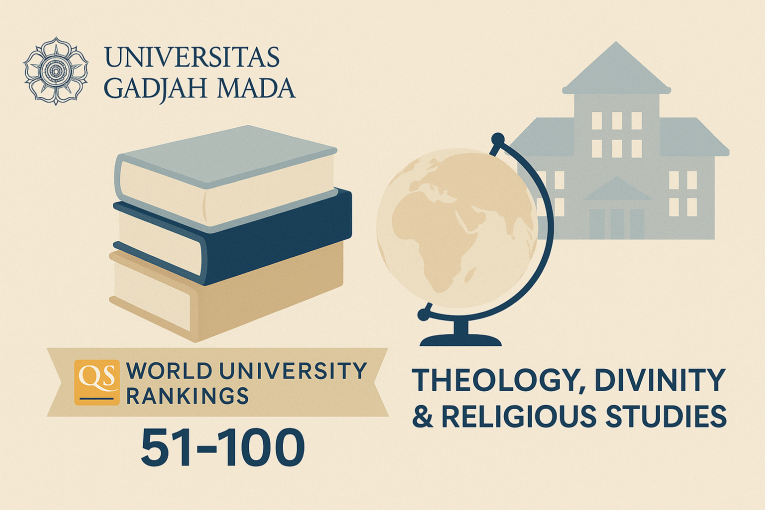
Our doctoral program, Inter-religious Studies (IRS), and master program Center for Religious and Cross-cultural Studies (CRCS) of postgraduate school Universitas Gadjah Mada has once again been ranked in the 51-100 range in the world in the Theology, Divinity, and Religious Studies cluster in the QS World University Rankings by Subject 2025. This is the third time the university has received this international recognition. Besides UGM, other universities in Indonesia that made it into the world ranking list are UIN Syarif Hidayatullah and Universitas Indonesia in the 101-150 world ranking range.
Dean of UGM Graduate School, Prof. Ir. Siti Malkhamah, M.Sc., Ph.D., IPU, ASEAN.Eng expressed her gratitude for this achievement. “We are very grateful and proud. This achievement is not only the result of the work of one study program, but the collective contribution of various study programs at our faculty and other faculties at UGM engaged in religious studies,” she said on Thursday (17/4).
Siti explained that some of the graduate school’s flagship study programs related to the Theology, Divinity, and Religious Studies cluster are the Inter-Religious Studies (IRS) doctoral program and the Religion and, Center for Religious and Cross-Culture Studies (CRCS) master program, both of which are held in English and have a strong international orientation. ‘The main advantages of these programs lie in the cross-disciplinary approach, the use of international languages of instruction, and research topics that are by the needs of the times and have a broad global impact,’ she added.
In the QS WUR by Subject assessment, four main indicators are used: H-Index, citations per paper, academic reputation, and graduate reputation. H-Index citations and citations per paper are measured based on lecturers’ productivity in indexed journals and collaboration with researchers from various institutions. Both indicators have increased, with H-Index points from 48.8 to 51 and citations per paper jumping from 64.3 to 82. ‘The reputation of our graduates is also strong with a very good and competitive acceptance rate in the world of work by occupying structural and strategic positions in various institutions,’ she added.
UGM is a pioneer in opening religious studies study programs in public universities in Indonesia. Since its establishment in 2000, the education provided is not only the theological study of religion but also combines it with social science and humanities approaches that make it superior.
The head of the IRS study program, Dr. Zainal Abidin Bagir, said that the strength of this study program lies in its seriousness in connecting the Tridarma of Higher Education. Researches by lecturers and students often target actual socio-religious issues such as community polarization, strengthening the capacity of religious instructors, ecological issues, and indigenous religions. ‘We collaborate a lot with coalitions of civil society organizations, often providing policy recommendations, and community assistance and development so that the knowledge developed not only contributes to international journals but also benefits the wider community,’ he said.
One of the other strengths that contribute to this ranking achievement is the international network that continues to be expanded. In the last two decades, the IRS and CRCS study programs have established partnerships with world-renowned universities such as Boston University, University of Leeds, Radboud University, and Florida International University. Not only in the form of collaborative research, but also cross-campus teaching, student exchange, and publishing international academic journals such as Studies in Interreligious Dialogue which is now based at UGM.
In the future, strengthening the quality of graduates and integration of the Tridharma of Higher Education will be a top priority with the continued development of fast-track master-doctoral programs and exploring double degrees with universities in Europe. Currently, it is in the process of refining agreements with the Netherlands, Germany, and Austria for double-degree programs that are expected to start this year. “World rankings are not our ultimate goal. What is much more important is to ensure that our scientific contributions continue to be relevant, down-to-earth, and become a bridge between groups in a plural society,” said Zainal.
This article was originally translated from here
